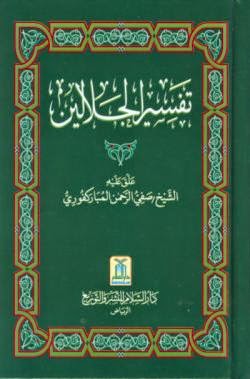
To the best of my knowledge, chapter 19 has not yet been analyzed or even described, thus the link between this text and the writings of al-Razi is revealed here for the first time. This theme appears in chapter 19 of Ibn Qayyim al-Jawziyya's magnum opus on predetermination and human choice, Shifa' al-'alil fi masa'il al-qada' wal-qadar wal-hikma wal-ta'lil (Healing the Person Afflicted with Wrong Concepts about Predetermination, Wisdom and Causality).Arranged as a debate between a Sunni, holding Ibn Qayyim al-Jawziyya's views and a Jabri, holding Ash'ari views, chapter 19 of Shifa' al-'alil is based on al-Razi's discussions on the doctrine of jabr. This article deals with Ibn Qayyim al-Jawziyya's critique on the interpretation of his Ash'ari contemporaries to al-Razi''s writings on the concept of jabr. Alexander Knysh, University of Michigan, Ann Arbor, USA. A must-read for every serious student and connoisseur of the Qur’an.’ Prof. Sohaib Saeed offers us a meticulous and readable translation of a masterpiece of Qur’anic exegesis by the great Muslim intellectual Fakhr al-Din al-Razi, whose goal was to illuminate every possible shade of meaning of the Muslim Revelation, from moral-ethical and legal, to rational and allegorical-mystical, not to mention linguistic, grammatical and historical. Jonathan AC Brown, Georgetown University, USA. Making it accessible to an English-speaking audience, by a translator who is a scholar himself, is a great contribution that will be appreciated by many for many years to come.’ Prof. ENDORSEMENTS: ‘Razi’s Tafsir is a monument to Islam’s great tradition of learning and an incredibly rich pathway into it. Abdel Haleem, King Fahd Professor of Islamic Studies, University of London. This volume includes a foreword by Professor M.A.S. This scholarly yet accessible translation gives readers a thorough understanding of the most commonly recited chapter of the Qur’an it also opens up for readers a window into the thought and practice of one of Islam’s greatest theologians.

The present volume is the first ever translation into English from The Great Exegesis and focuses on the first chapter of the Qur’an, the Fatiha.

The Great Exegesis is a compendium not only of Qur’anic sciences and meanings, but also Arabic linguistics, comparative jurisprudence, Aristotelian and Islamic philosophy, dialectic theology and the spirituality of Sufism. Written in the twelfth century, this commentary on the Qur’an has remained until today an indispensable reference work. 1210), also known as Mafatih al-Ghayb, is one of the great classics of Arabic and Islamic scholarship. The Great Exegesis by Fakhr al-Dīn al-Razi (d.

Sample (Contents, Foreword & Introductions) from Dr Sohaib Saeed's translation of the first volume from Razi's Tafsir (published September 2018).


 0 kommentar(er)
0 kommentar(er)
